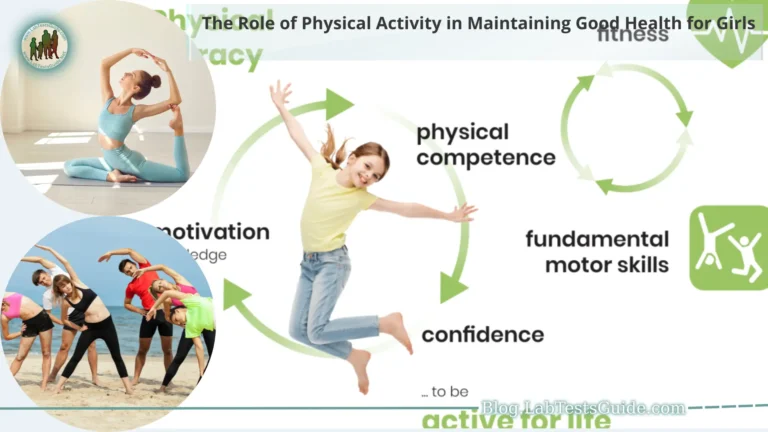Regular health check-ups play a vital role in maintaining the well-being and overall health of girls. These check-ups involve comprehensive assessments of various aspects of their physical, mental, and reproductive health. By engaging in regular health check-ups, girls can benefit from early detection of potential health issues, preventive measures, and the establishment of healthy habits that can last a lifetime.

This article aims to highlight the importance of regular health check-ups for girls and provide insights into the benefits they offer. It will also discuss the recommended check-ups for girls, including general physical examinations, vaccinations, vision and hearing tests, dental check-ups, reproductive health assessments, and mental health evaluations. Additionally, the article will address common barriers to accessing health check-ups and explore strategies to encourage girls to prioritize their health through regular check-ups.
By understanding the significance of regular health check-ups and taking proactive steps, girls can take control of their well-being and lead healthier lives.
Understanding Regular Health Check-ups:
Regular health check-ups involve scheduled visits to healthcare professionals to assess and monitor various aspects of an individual’s health. For girls, these check-ups are particularly important as they provide an opportunity to address specific health concerns, detect potential issues at an early stage, and establish a foundation for a lifetime of healthy habits.
During a health check-up, healthcare providers evaluate different aspects of a girl’s health, including her physical, mental, and reproductive well-being. They may conduct various tests, examinations, and screenings to gather information and identify any abnormalities or risks. These check-ups serve as proactive measures to prevent illnesses, promote overall health, and ensure that girls are on track for healthy development.
The frequency of health check-ups may vary depending on factors such as age, medical history, and individual needs. In general, it is recommended that girls have regular check-ups at least once a year, but certain age groups or specific health conditions may require more frequent visits.
Health check-ups provide an opportunity for girls to discuss any concerns or questions they may have with healthcare professionals. It is essential for girls to actively participate in these appointments, share their symptoms or experiences, and engage in open and honest conversations about their health. By doing so, they can receive appropriate guidance, support, and necessary interventions to maintain optimal health.
In the following sections, we will explore the benefits of regular health check-ups for girls, including early detection of health issues, prevention and health maintenance, and the establishment of healthy habits that contribute to a lifetime of well-being.
Benefits of Regular Health Check-ups for Girls:
Early Detection of Health Issues: Regular health check-ups enable early detection of potential health problems in girls. Through physical examinations, screenings, and tests, healthcare professionals can identify any signs or symptoms of illnesses or disorders. Detecting health issues at an early stage increases the chances of successful treatment and improves health outcomes.
- Prevention and Health Maintenance: Health check-ups play a crucial role in preventive healthcare. Girls can receive vaccinations to protect against various diseases, such as HPV (human papillomavirus), meningitis, and influenza. Additionally, healthcare providers can offer guidance on healthy lifestyle choices, nutrition, exercise, and stress management, helping girls develop habits that promote long-term well-being.
- Establishing Healthy Habits: Regular health check-ups provide an opportunity for girls to learn about healthy habits and make informed decisions about their well-being. Healthcare professionals can discuss topics like proper hygiene, healthy eating habits, the importance of physical activity, and avoiding risky behaviors such as smoking, substance abuse, or unsafe sexual practices. By incorporating these habits early on, girls can lay the foundation for a healthy future.
- Emotional and Mental Health Assessment: Health check-ups encompass not only physical health but also mental and emotional well-being. Healthcare providers can assess a girl’s mental health through discussions, questionnaires, and screenings for conditions like anxiety, depression, eating disorders, or self-esteem issues. Early identification and intervention can help prevent the escalation of mental health concerns and promote emotional well-being.
- Reproductive Health Care: Regular health check-ups for girls involve assessments and discussions related to reproductive health. Healthcare providers can address concerns about puberty, menstrual health, contraception, sexually transmitted infections (STIs), and provide guidance on maintaining a healthy reproductive system. These check-ups also offer an opportunity to discuss sexual education, consent, and healthy relationships.
- Monitoring Growth and Development: Health check-ups allow healthcare professionals to monitor a girl’s growth and development over time. Measurements such as height, weight, and body mass index (BMI) can indicate any potential issues or deviations from the expected growth patterns. Regular monitoring helps identify and address developmental concerns promptly.
By prioritizing regular health check-ups, girls can benefit from early detection, prevention, and the development of healthy habits. These check-ups empower them to take an active role in their health and well-being, leading to a healthier and more fulfilling life. In the following sections, we will discuss the specific recommended health check-ups for girls, including physical examinations, vaccinations, vision and hearing tests, dental check-ups, reproductive health assessments, and mental health evaluations.
Recommended Health Check-ups for Girls:
General Physical Examination: A comprehensive physical examination is a fundamental component of regular health check-ups for girls. It involves measuring vital signs such as blood pressure, heart rate, and temperature. The healthcare provider will also assess overall physical health, including checking the heart, lungs, abdomen, and examining the skin for any abnormalities. This examination helps identify any underlying health issues or potential risks.
- Vaccinations: Vaccinations are essential for preventing various diseases and promoting public health. Girls should receive age-appropriate vaccinations as recommended by healthcare professionals and national immunization guidelines. Common vaccinations for girls may include those for diseases such as HPV, meningitis, tetanus, diphtheria, pertussis, and influenza.
- Vision and Hearing Tests: Regular vision and hearing tests are crucial for early detection of any impairments or conditions that may affect a girl’s sensory health. These tests can identify vision problems like nearsightedness, farsightedness, or astigmatism, as well as hearing impairments that may require further evaluation or intervention.
- Dental Check-ups: Oral health is an integral part of overall well-being. Girls should undergo regular dental check-ups, including dental cleanings and examinations. These check-ups help prevent cavities, gum diseases, and other oral health issues. Dental professionals can provide guidance on proper oral hygiene practices and address any concerns related to dental development, orthodontics, or oral habits.
- Reproductive Health Check-ups: As girls approach puberty and adolescence, it is important to include reproductive health assessments in their regular check-ups. These may involve discussions about menstruation, menstrual hygiene, sexual education, contraception options, and prevention of sexually transmitted infections (STIs). Healthcare providers can address concerns, provide guidance, and ensure that girls have access to the necessary resources for their reproductive health needs.
- Mental Health Assessment: Girls’ mental and emotional well-being should be assessed as part of regular health check-ups. Healthcare providers can use standardized questionnaires, interviews, or screenings to evaluate mental health conditions such as anxiety, depression, eating disorders, or behavioral issues. Early identification and intervention can support proper mental health management and provide necessary support services.
It is important to consult with healthcare professionals to determine the specific frequency and timing of these check-ups based on factors such as age, medical history, and individual needs. By regularly attending these check-ups, girls can proactively manage their health, address any concerns, and receive appropriate guidance for their overall well-being.
Overcoming Barriers to Health Check-ups:
Despite the importance of regular health check-ups for girls, several barriers can hinder access to these vital healthcare services. Addressing these barriers is crucial to ensure that girls have equitable opportunities to prioritize their health. Here are some common barriers and strategies to overcome them.
- Lack of Awareness and Education: Many girls and their families may lack awareness of the importance of regular health check-ups and the specific healthcare services available to them. Education campaigns targeted at schools, communities, and parents can help increase awareness about the benefits of check-ups and provide information on how to access healthcare services.
- Socioeconomic Factors: Financial constraints, lack of health insurance, and limited access to transportation can be barriers to regular health check-ups. Initiatives such as subsidized healthcare programs, school-based health clinics, or mobile health units can help address these socioeconomic barriers by providing affordable or free healthcare services and eliminating transportation challenges.
- Cultural and Stigma-Related Issues: Cultural beliefs, stigmatization, and taboos surrounding certain health topics can discourage girls from seeking regular check-ups. Culturally sensitive and inclusive healthcare services, along with community engagement and awareness programs, can help overcome these barriers. Encouraging open dialogue and providing a safe and non-judgmental environment can promote girls’ comfort in discussing their health concerns.
- Access to Healthcare Services: Limited availability of healthcare providers, especially in rural or underserved areas, can make it challenging for girls to access regular health check-ups. Expanding healthcare infrastructure, recruiting and training healthcare professionals, and implementing telemedicine or telehealth services can enhance access to healthcare services, particularly in remote areas.
By implementing these strategies, we can work towards removing barriers to regular health check-ups for girls, ensuring that they have equal opportunities to receive necessary healthcare services and support for their well-being. It is crucial to involve families, communities, schools, and healthcare systems in creating an environment that prioritizes and supports girls’ health needs.
Encouraging Regular Health Check-ups for Girls:
Promoting regular health check-ups for girls requires a multi-faceted approach involving various stakeholders. Here are some strategies to encourage and facilitate regular health check-ups for girls.
- Parental Involvement and Support: Parents play a critical role in advocating for their daughters’ health. Encouraging parents to prioritize regular health check-ups and providing them with information about the importance of these visits can help ensure girls receive necessary healthcare. Healthcare providers can engage parents during visits, offer guidance on scheduling appointments, and address any concerns or questions they may have.
- School-based Health Programs: Schools can serve as a platform to promote regular health check-ups for girls. Collaboration between schools and healthcare providers can facilitate on-site health check-ups, vaccinations, and health education sessions. School nurses or counselors can disseminate information about check-ups and help coordinate appointments, making it convenient for girls and their families to access healthcare services.
- Community Outreach and Awareness Campaigns: Community organizations, non-profit groups, and healthcare institutions can collaborate to organize outreach programs and awareness campaigns focused on the importance of regular health check-ups for girls. These initiatives can include health fairs, workshops, and educational sessions targeting girls, parents, and community members. Providing culturally sensitive information and addressing common misconceptions can help break down barriers and encourage utilization of healthcare services.
- Healthcare Provider Communication and Engagement: Effective communication between healthcare providers and girls is crucial in promoting regular health check-ups. Providers can use age-appropriate language, actively listen to girls’ concerns, and create a safe and supportive environment during appointments. Additionally, engaging girls through technology, such as appointment reminders via text messages or telehealth options, can enhance accessibility and convenience.
- Collaboration with Schools and Educational Institutions: Healthcare providers can collaborate with schools and educational institutions to integrate health education into the curriculum. By incorporating information about the importance of regular health check-ups, puberty, reproductive health, and overall well-being, girls can develop an understanding of the value of these visits and become empowered to take charge of their health.
- Empowering Peer Networks: Peer support can play a significant role in encouraging regular health check-ups for girls. Creating peer support groups or programs where girls can share experiences, knowledge, and information about health check-ups can help reduce stigma and provide a supportive community that promotes health-seeking behavior.
By implementing these strategies, we can foster a culture that encourages and supports regular health check-ups for girls. Empowering girls, parents, schools, healthcare providers, and communities to prioritize and actively engage in healthcare can lead to improved health outcomes and a lifetime of well-being.
Conclusion:
Regular health check-ups are of utmost importance for girls, as they provide opportunities for early detection of health issues, prevention and health maintenance, and the establishment of healthy habits. By attending these check-ups, girls can proactively manage their physical, mental, and reproductive well-being, setting the foundation for a healthy future.
The benefits of regular health check-ups for girls are numerous. Early detection of health issues allows for timely intervention and treatment, improving health outcomes. Preventive measures, such as vaccinations and guidance on healthy habits, help girls maintain optimal health and reduce the risk of future health problems. Additionally, health check-ups provide a platform to address reproductive health concerns, monitor growth and development, and assess mental and emotional well-being.
However, barriers to accessing regular health check-ups exist and must be overcome. Lack of awareness, socioeconomic factors, cultural stigma, and limited access to healthcare services can hinder girls’ ability to receive necessary check-ups. By implementing strategies such as education campaigns, subsidized healthcare programs, culturally sensitive care, and community outreach initiatives, we can address these barriers and ensure equitable access to healthcare services for all girls.
Encouraging parental involvement, leveraging school-based health programs, and fostering collaboration between healthcare providers, schools, and communities are essential in promoting regular health check-ups. By empowering girls, providing them with knowledge and resources, and creating a supportive environment, we can empower them to prioritize their health and well-being.
Regular health check-ups for girls are not only crucial for their immediate health needs but also contribute to their long-term well-being and development. By embracing the importance of regular check-ups and working collectively to overcome barriers, we can ensure that girls have the opportunity to lead healthy, fulfilling lives.






